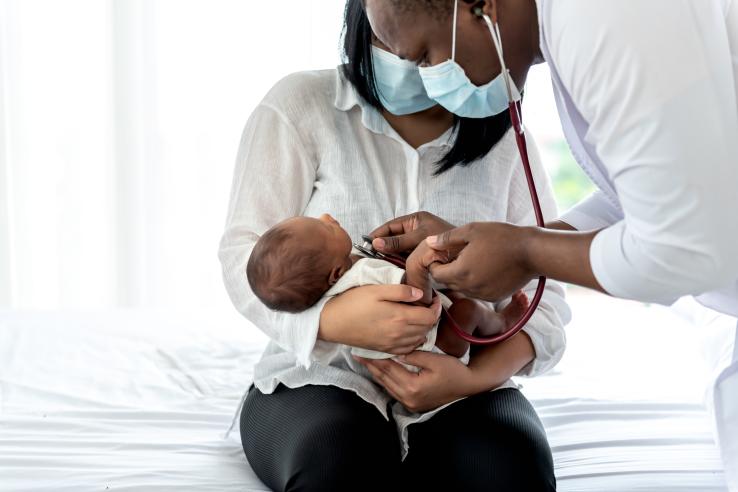
Promoting rigorous, actionable research in maternal and newborn health in the United States

The United States is facing a crisis in maternal and newborn health. More evidence from randomized evaluations is needed to determine which policies and programs best support the health and well-being of individuals before, during, and after pregnancy. Ongoing J-PAL studies are evaluating promising interventions, but more action-oriented, collaborative research between social scientists, clinicians, and policy-makers is needed.
Maternal and newborn health in the United States
Long before the Dobbs vs. Jackson Supreme Court decision overturning federal abortion protections threatened the well-being of countless individuals across the United States, maternal and newborn health in the United States lagged far behind high-income peer countries by almost every measure.
Over 10 million women in the United States are uninsured, leading many to delay or avoid medical care. Inadequate access to health care puts individuals at higher risk of poor outcomes during pregnancy and delivery. For example, many women lack access to effective contraception to prevent unintended pregnancies and have difficulty accessing care to prevent and manage chronic conditions. Difficulty accessing timely health care before and during pregnancy can increase the risk of maternal and newborn complications, with the Covid-19 pandemic driving the high US maternal mortality rate even higher. The aforementioned pre-existing risk factors, as well as disparities in access to maternal care services, limited access to home visits, and a lack of guaranteed paid maternity leave, all contribute to these often preventable deaths.
Race and income level also profoundly affect maternal and newborn health outcomes. Black, non-white Hispanic/Latino/a, and Indigenous individuals are more likely than white individuals to die from pregnancy-related causes. Maternal mortality rates for individuals living in counties with high poverty rates are two times higher than those living in counties with low rates of poverty. Children born into poverty often experience low birth weight and infant mortality, as well as longer-term health impacts.
Ongoing J-PAL North America-supported research
Systemic, equitable change in maternal and newborn health care access and delivery is urgently needed. However, while many policies and programs seek to improve maternal and newborn health, we often don’t know which are most effective. Evaluation of these policies is necessary to ensure that investments in maternal and newborn health are directed toward the most impactful interventions.
Randomized evaluations are a rigorous form of evaluation and a powerful tool for guiding clear and actionable policy recommendations. J-PAL North America aims to facilitate randomized evaluations in the maternal health space. To date, we have supported various projects, from pilots to full randomized evaluations, that study a variety of promising, innovative interventions, including:
Contraception use information and subsidies
Given the importance of contraception in promoting health and workforce engagement, two studies are assessing interventions to increase contraception use.
The M-CARES study is evaluating the impact of subsidies for long-acting reversible contraception on two groups that experience high rates of unintended pregnancy: pregnancy-capable individuals living in poverty and those who are pregnant and are seeking an abortion.
Additionally, insufficient spacing between pregnancies contributes to morbidity and mortality risk for birthing parents and babies. A pilot study surveyed postpartum individuals and found that many respondents were not using contraception, and few exhibited knowledge of family planning. When asked about the idea of pediatricians providing contraceptive counseling, most respondents showed support. Findings from this pilot will be used to design a full-scale randomized evaluation assessing the impact of contraceptive counseling for birth parents at their infants’ pediatric visits on postpartum contraceptive use.
Strategies to increase benefit take-up among pregnant individuals
Programs such as the Special Supplemental Nutrition Program for Women, Infants, and Children (WIC) aim to promote healthy lifestyles for pregnant individuals and their children. However, not all eligible pregnant individuals participate.
A growing body of evidence points to behavioral nudges as impactful at increasing benefit take-up. A pilot study, “Increasing Uptake and Improving Health: Experimental Evidence on Take-Up of the WIC Program,” builds off of this evidence and studies the impact of a menstruation and pregnancy smartphone app on encouraging WIC take-up among WIC-eligible individuals.
Comprehensive medical support for pregnant individuals
Interventions that expand mental health and socio-emotional support for pregnant individuals, beyond standard-of-care, are being evaluated by two studies as promising solutions to supporting the health of both birthing parents and children.
The South Carolina Nurse-Family Partnership study is evaluating the impact of a nurse home visiting program on maternal and early childhood outcomes. This landmark study represents the first modern randomized evaluation of nurse home visiting programs at this scale.
Early evidence showed the program had no impact on birth outcomes, suggesting that home visiting programs may not be sufficient to address the myriad barriers pregnant individuals face. Over the coming decades, the evaluation will continue to assess program impacts on a range of outcomes related to families’ health and well-being.
The 123-MOMS evaluation seeks to understand the impact of Cognitive Behavioral Therapy and information about parenting skills on low-income pregnant individuals with depressive symptoms. It will aim to study the effect on child development, mothers’ mental health, and economic outcomes.
Encouraging primary care among postpartum individuals
Increasing health care utilization for postpartum individuals may promote long-term chronic disease management and health care utilization. An ongoing study is testing whether targeted messaging, default primary care appointment scheduling, reminders, and other behavioral-science informed interventions can bridge transitions from postpartum care to primary care for individuals with a chronic disease.
Financial support to recent parents and families
While much evidence links poverty and poor health, there is little known about this relationship's causal nature. Two studies aim to garner clearer ideas of the impact of financial support on young children’s outcomes.
The Baby’s First Years study aims to understand how financial support affects the health and well-being of children growing up.
One-year outcomes indicate that poverty reduction affected children’s brain activity, as children in families who received the transfer displayed different brain activity patterns than children whose mothers received a nominal sum of $20 a month. The activity pattern found in the high-cash group has been correlated in other studies with higher language, cognitive, and social-emotional functioning later in childhood and adolescence, though more research is needed.
A pilot study, “Overcoming Financial Barriers to Caring for Preterm Infants,” evaluated the impact of financial support on caregivers’ ability to breastfeed and provide skin-to-skin care to preterm infants. Preliminary findings demonstrate the potential for financial support to increase parents' engagement with caregiving behaviors for preterm infants during the NICU stay. A larger trial funded by the National Institute of Child Health and Human Development will launch in 2023.
Key areas for future work
These ongoing research projects represent valuable opportunities to learn more about approaches to improving maternal and newborn health. However, given the urgency for effective policy action in this space, there is an ongoing need for more research and clear recommendations.
J-PAL North America is committed to supporting and catalyzing future randomized evaluations in this space to understand what is most effective. We aim to advance broad, cross-disciplinary collaborations that can incorporate insights across economics, behavioral science, public health, and medicine to develop impactful evaluations on innovative interventions. These collaborations can facilitate research that is action-oriented and embedded within clinical practices, offering an immediate path to scaling up promising results.
As we continue to build this body of evidence, we want to ensure it is community-oriented and clinician-led. We welcome readers interested in collaborating with us, particularly clinicians or program implementers in this space, to contact any of the authors on this post or the US Health Care Delivery Initiative. We look forward to hearing from you.
Subscribe to J-PAL North America’s Health Care Delivery newsletter to stay up to date on the latest evaluations, news, and requests for proposals on health care.
Related Content

How government, academic, and nonprofit partners are working to evaluate a home visiting program in South Carolina to improve family health and wellbeing

Reflecting on the benefits of evaluating a health care delivery program: A recap from the HCDI @ 8 Convening



